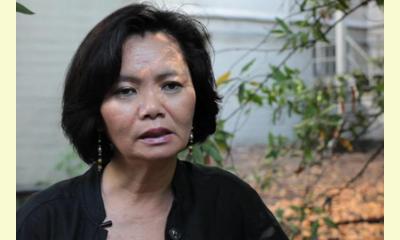|
|
In Cambodia, the women are saying, “No!”
an article by Dan Moshenberg for Women in and Beyond
Video: Women of Cambodia say "No!"
Yorm Bopha,
Tep Vanny, Phan Chhunreth, Song Srey Leap, and Bo
Chhorvy – five women land rights activists –
were arrested today, while peacefully petitioning
for the release of other Boeung Kak lake activists
arrested over the weekend. Boeung Kak lake, in the
heart of Phnom Penh, has been the site of
major `urban development’, which means mass
evictions. And women have been the heart of the
Boeung Kak lake pro-democracy, women’s rights,
community rights, land rights movements.

Mu Sochua (scene from video)
click on photo to enlarge
These arrests take place against the backdrop of
the recent women garment worker demonstrations
across Cambodia, and the State response of
criminalization and repression of public dissent
and gathering. Women workers have been protesting for
over a year. In many ways, they have been
protesting for decades.
This is the face of Cambodian `stability’ and
`development’: women facing mass eviction, women
facing super exploitation. In both instances, the
logic has followed the gender of sacrifice. Women
must give up land and lives for `the good of the
nation.’ Around the world, this is a familiar
tune, the song women as silver or
diamond, and the women of Cambodia reject it,
as they have for decades.
At one of the intersections of land rights,
workers’ rights, and women’s rights stands Mu Sochua.
As government forces
attacked women garment workers, over the
weekend, Mu Sochua, an opposition Member of
Parliament, explained and contextualized. She explained that the workers’
demonstration were about a living wage and about
democratic governance. She explained that,
for the first time, all the trade unions had
joined together and had joined together with the
Cambodia National Rescue Party. When the State
fired its AK47s, it took aim at both labor and
democracy, and the heart of those movements, this
weekend as so often before, is women workers,
organizers, and advocates.
According to Mu Sochua, “The workers
are now hiding. They’re living in fear. Do
you want to wear clothes made by people who live
in fear? With the wages they get today, they can’t
even get three nutritious meals in a day. … Does
the international community want to continue to
support this kind of dictatorship … and support
international buyers who make billions while our
workers are deprived of basic rights?”
Mu Sochua has been
posing the question, and pushing the crisis,
of human rights, women’s rights, workers’ rights,
democracy in Cambodia for a long time. Sochu a has
been targeted by the State and has kept on keeping
on. She led the struggle against the hyper-
exploitation and abuse of Cambodian women and
girls working as domestic workers in Malaysia.
She connected the development logic of
landgrabbing within Cambodia to the export of
women workers by Cambodia. Sochua founded Khemera,
the first women’s rights organization and the
“first indigenous NGO” in modern Cambodia. She has faced imprisonment
and worse, and much of this while a sitting
Member of Parliament.
Throughout, Mu Sochua’s message has been clear.
Democracy matters. Women matter. Justice matters.
Cambodia matters. The garment factories of
Cambodia have been reaping mass
profits while cutting workers’, women
workers’, salaries. The State has been claiming
democracy while ignoring the will of the people,
in development projects for the rich, in
industrial production, in national elections. Do
you want to support dictatorship, political,
economic, and `developmental’? In Cambodia, the
women are saying, “No!”
[Note: Thank you to Janet Hudgins, the CPNN reporter
for this article.]
|








|
DISCUSSION
Question(s) related to this article:
Do women have a special role in poverty reduction?,
* * * * *
Latest reader comment:
According to the target articles (above), as well as many other economic analyses and reports, the key to poverty reduction is the education and employment of women and their actions for economic justice.

|
|









